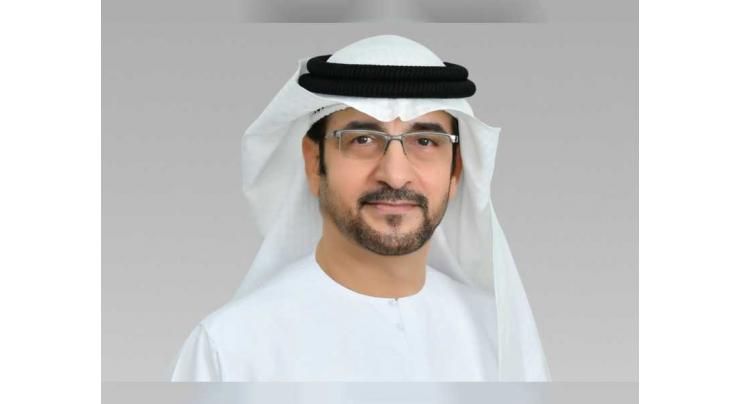
- Home
- Middle East
- UAE
- Ministry of Energy and Infrastructure, UAEU accelerate efforts to develop innovative, eco-friendly, ..
Ministry Of Energy And Infrastructure, UAEU Accelerate Efforts To Develop Innovative, Eco-friendly, And Sustainable Concrete
Mohammad Ali (@ChaudhryMAli88) Published September 06, 2021 | 05:45 PM

ABU DHABI, (UrduPoint / Pakistan Point News / WAM - 06th Sep, 2021) Ministry of Energy and Infrastructure is expanding its research area in engineering infrastructure and buildings of concrete, with the signing of two agreements with United Arab Emirates University (UAEU) to develop economical and sustainable structural engineering solutions that are aligned with UAE Vision 2021 and Abu Dhabi Vision 2030.
Eng. Hassan Almansoori, Under-Secretary for Infrastructure and Transport Affairs, and Prof. Ghaleb Alhadrami Albreiki, Acting Vice Chancellor of the UAEU, signed the cooperation agreements and funding for two research projects between the two sides. The collaboration aims to develop and produce innovative, sustainable, and environment-friendly concrete for structural applications. Civil engineering infrastructure development in the UAE and the Gulf region represents substantial investments, worth billions of Dollars. Engineering solutions to protect such investments are explored in the form of innovative research in structures and materials.
The first innovative research project aims to develop concrete capable of self-healing with limited to no external interventions to protect the substantial investment in concrete infrastructure in the UAE and the world. Self-healing concrete is considered an innovative, green, and cost-effective solution that would minimise the maintenance cost and prolong the service life of civil engineering infrastructure.
The second research project aims to investigate the potential replacement of natural aggregates by recycled concrete aggregates obtained from construction and demolition waste to produce innovative and sustainable basalt fibre-reinforced recycled aggregates concrete for structural applications.
The inclusion of basalt fibres in recycled aggregates concrete would prolong the service life and reduce the maintenance cost. The development of such concrete would contribute to the advancement of the concept of circular economy through the recycling of construction and demolition waste and reduction in the consumption of natural resources.
The period for completing these two projects and issuing the corresponding recommendations is two years, therefore, by 2023 outcomes of these projects would help the country to adopt more flexible and sustainable infrastructure, to prepare for the inevitable effects of climate change on the infrastructure.
Commenting on the projects, Eng. Almansoori said, "These two important projects represent many of our core beliefs and visions. The need to work closely together with both, the public sector and academia to focus on innovation and continuous development of our strategies and solutions and most importantly to look towards building better tomorrow than we did yesterday, environmentally, economically, and socially."
Prof. Albreiki said, "The UAEU is becoming a dynamic institute with a wide range of interdisciplinary scholarly activities. Our top research teams and scientists will provide their expertise through a strong international network of specialists. UAEU is committed to the national vision, particularly through action in line with the United Nations Sustainable Development Goals (UN-SDGs) as recently seen in the Impact Rankings."
Related Topics
Recent Stories

Rock-solid Ruud racks up season-leading win in Barcelona

At UN, Iran says it will make Israel 'regret' reprisals

G7 hears calls for 'critical' Ukraine aid

EU seeks to leverage might to confront China, US challenge

5 Customs officials martyred as their vehicle ambushed by terrorists in D I Khan

Pak-New Zealand match called off due to rain

NHA restores traffic on roads affected by recent rains in Balochistan

China to fully support Pakistan's efforts against terrorism: Ambassador Jiang

U.S. envoy calls on Foreign Minister Ishaq Dar

Poland arrests man over suspected plan to kill Zelensky

EU wants to ease youth movement to and from UK

Police foils attempt of supply mainpuri raw material
More Stories From Middle East
-

UAE announces ‘Zero Bureaucracy Program’ to reduce bureaucracy
3 months ago -

COP28 President-Designate welcomes Transitional Committee agreement to operationalise Loss and Damag ..
6 months ago -

Global Media Congress 2023 to feature Co-Production Majlis as a new networking platform
6 months ago -

Young female athletes shine at Abu Dhabi World Youth Jiu-Jitsu Championship
6 months ago -

King of Jordan receives Abdullah bin Zayed and ministers participating in Arab coordination meeting
6 months ago -

Abdullah bin Zayed participates in coordination meeting of Arab foreign ministers, joint meeting wit ..
6 months ago
-

3rd annual conference of Emirates Society of Clinical Microbiology kicks off in Dubai
6 months ago -

SIBF 2023 hosts Nobel laureate to discuss emergence of ‘Afrofuturism’ in global discourse
6 months ago -

ALC announces winners of Kanz Al Jeel Award 2023
6 months ago -

SIBF turns spotlight on remarkable contributions of women
6 months ago -

Global assets in spot bitcoin ETFs hit $4.16 billion
6 months ago -

Rescuers struggle to find Nepal quake survivors as deaths reach 157
6 months ago











